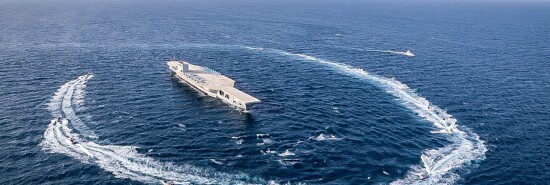
Three reasons the US shouldn’t use Marines to guard commercial vessels from Iran
Tom Rogan
Video Embed
The threat posed by Iran to civilian shipping, in particular from its Islamic Revolutionary Guard Corps, is real and unacceptable. Still, it would be a mistake for the Biden administration to deploy U.S. military personnel to guard commercial vessels transiting the Strait of Hormuz.
The Biden administration is apparently in advanced stages of planning just such an operation. The Strait of Hormuz is a key strategic waterway separating the Gulf of Oman and Indian Ocean from the Persian Gulf.
XI REMINDS THE PEOPLE’S LIBERATION ARMY THAT HIS IS THE ABSOLUTE AUTHORITY
The Associated Press reports that the plan would entail “Marines and Navy sailors [providing] the security only at the request of the ships involved.” The centerpiece of any effort would seem likely to focus on the USS Bataan-embarked 26th Marine Expeditionary Unit. That MEU is likely to arrive in the Gulf of Oman in the next four to seven days. Unfortunately, there are three problems with this prospective plan.
First off, it would use the U.S. military for an unfit purpose. Yes, the Marine Corps and the Navy have a standing mission to protect U.S. vessels and those of partner nations. But serving sentry duty on civilian vessels is not part of their day-to-day duties. To employ personnel in this role would entail a dangerous mission creep. One in which military forces assume what should be a civilian security or multinational-military role. Ultimately, it is the responsibility of each nation to protect its own civilian vessels. It is the responsibility of civilian companies to provide their crews and cargo with appropriate armed security.
The second problem here is that this proposal would employ forces in a role they are not designed for. Marines and Navy ship-boarding units are trained both to defend and seize vessels from hostile forces. That includes boarding operations on civilian vessels. Yet employing these forces in the role as described would be an extensive, resource-draining one.
Crucially, it would significantly degrade the 26th MEU’s immediate action readiness for priority contingency operations. This diminished readiness would be felt most sorely with the MEU’s ground combat element, its Battalion Landing Team from the 1st Battalion, 6th Marine Regiment. After all, the near entirety of that unit would have to be deployed to effect any scaled security mission. And the only way this prospective plan could effectively deter Iran would be if it was employed at scale.
Finally, there’s a far better alternative to deploying Marines and sailors on this open-ended mission: The U.S. could impose direct costs on Iran for what it is doing. President Joe Biden could warn the IRGC that any naval units responsible for sending out seizure teams will be targeted for destruction. If its ships and ports are ablaze, the IRGC will reassess the benefits of its piracy. Iran is already actively trying to assassinate high-level active and former U.S. public servants and military personnel, so it’s not as if the U.S. would be escalating on a whim. The top line is that Iran is engaged in state piracy. It must not stand.
Considering these arguments, it’s worth asking if something else is motivating the Biden administration’s consideration of this proposal. I suspect there is another factor in play here.
Namely, that the White House sees this as a public relations savvy way to rebuild confidence with Saudi Arabia and the United Arab Emirates. The Saudis have been particularly aggravated by the ill-judged U.S. obsession over Jamal Khashoggi and by the White House’s weakness in face of Iranian aggression. This has led them to increasingly abandon their decades long and, until now, mutually beneficial security and economic alliance with the U.S. Putting Marines on commercial vessels might appear a relatively easy way for Biden to pretend he’s getting tough on Iran without actually challenging Iranian aggression.
Regardless, this proposal is a misguided one.
